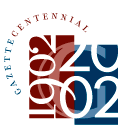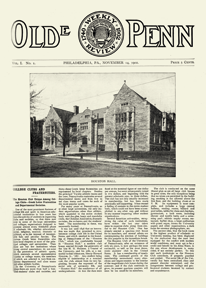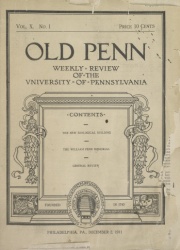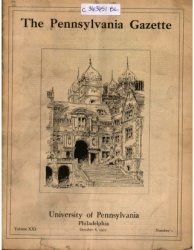
Here are summaries of Gazette issues at 10-year intervals during our 100 years of publication, from the first eight-page issue, in November 1902, to October 1992.
November 14, 1902
The first Olde Penn featured a photo and article on the attractions of Houston Hall. Other features included the announcement of a $100,000 gift by E.W. and C.H. Clark to endow a professorship in Assyriology, to be held by Dr. Herman V. Hilprecht, whose excavations at Nippur would make him a star at Penn and a favorite of Old Penn; a respectful piece on the late Walter Cope, of the architectural firm Cope & Stewardson, illustrated with a pen-and-ink sketch of the new dormitories that became known as the Quadrangle; a book review of Pennsylvania Verse, edited by William Otto Miller C’04, which “contains specimens of the genius of William Smith, first provost of the University; Francis Hopkinson C1757; Dr. S. Weir Mitchell 1848; Felix E. Schelling 1881,” and others; and a story on the football team’s 11-0 loss to Harvard, which judging by the headline, was a moral victory at least: “Unanimous Verdict/All United on Brilliant Work of Penn’s Team/What they Say Now About Our Football Team.”
Advance announcements, which appeared on the back page, listed an oral surgical clinic, a meeting of the Chess and Checker Club, the upcoming football game with Carlysle, and a notice of the class meeting of the Botanical Society of Pennsylvania, whose topic would be: “Plants Producing Delirium.”
September 28, 1912
The magazine reported on the division of the College into three separate schools: the College, composed of the department of arts and science, summer school, and courses for teachers; Towne Scientific School, composed of architecture, chemistry, chemical engineering, electrical engineering, and mechanical engineering; and the Wharton School. A roundup of campus construction projects stated that ground was broken on the new Evans Institute and University Dental School as well as an addition to the University Museum. And the “zoological building” was finished along Hamilton Walk.
Provost Edgar F. Smith wrote his impressions of Dublin, where he traveled for the Bi-Centenary Exercises of Dublin University’s medical school. His activities included attending a memorial-stone unveiling, a garden party at the home of the chancellor of Trinity College, and a Trinity College and University Dramatic Society presentation of Oliver Smith’s She Stoops to Conquer: “I had a splendid balcony seat, which enabled me to look down upon the audience below, an audience consisting largely of students, men and women, and I must confess, the co-eds were exceedingly attractive in appearance and manner.” Also printed in the magazine was “An Important Note to Physicians,” warning that, “A man representing himself to be Edgar S. Everhart of the Class of 1907 Medicine is wanted in a number of cities to answer charges of getting money under false pretences. According to reports the man has the names of many prominent Pennsylvanians located from Chicago to Seattle.”
October 6, 1922
An article about the opening of the school year marveled at the cordial reception extended by upper classmen to new students, reporting that the upper classmen “[took] them about the University on sightseeing tours and in general [made] them feel at home. Of course the sophomores could not be expected to overlook their prerogative of teaching the freshman his place. So on Thursday night they did their duty as they saw it by clipping patches of hair from the heads of as many first-year students as they could find. They corralled a great many others and made them run the gauntlet, but they used their belts in place of paddles.”
A complete text of acting provost Josiah Penniman’s opening-day address at Weightman Hall was printed. He advised students to “maintain a proper self-respect, but try to keep yourselves free at all times from ideas of your own importance,” and added the warning that “the University is a place of opportunity, but it is no place for the intellectual loafer, no matter how charming his personality may be.”
A magazine spread was devoted to a “bird’s eye view” illustration of the new, expanded football stadium. In faculty news, it was reported that Dr. Arthur Holmes, just named professor of psychology, would have charge of a new “department for the welfare of male students.” He was the author of books including Decay of Rationalism, Conservation of the Child, Principles of Character Making, When to Send for the Doctor, and Backward Children.
In alumni news, Dr. Emory R. Johnson, dean of the Wharton School, sailed for South America to represent the U.S. government and the U.S. Chamber of Commerce on trade issues and to address alumni groups in Brazil, Uruguay, Argentina, Chile, and Peru.
October 1, 1932
The Gazette reported that the Rittenhouse orrery marked the exact day, hour, minute, and second of a recent eclipse: “When men know the exact second at which the moon will start its journey ‘across the sun’s face,’ as we say, the exact speed of its passage, the exact period of the shadow and can mark the completion of the eclipse with accuracy, terror and all sense of alarm gives way to holy awe in the presence and demonstration of Infinite Power that so orders the Universe that it goes on in endless operation, from the beginning through eternity, in faithful and unchanging performance of a plan.” Progress was cited in the “cancer war” with the discovery by Dr. Ellice McDonald and Dr. A.J. Allen of a way to create ultraviolet flares within the human body by introducing certain chemicals into a given area before exposure to X-rays. Another article told how the University “has weathered the storm” of the collapse of the world’s markets. Horse breeder, racer and art collector Joseph E. Widener C1893 was the subject of a feature.
September 1942
To aid the war effort, the University offered a special 12-week summer term to accelerate the progress of candidates toward their degrees. Other news items included the announcement that the School of Fine Arts was offering a course in civilian camouflage and that the Wistar Institute had found a change in the blood of rats subjected to the stress of air blowing out of a hose near their cages, which made a noise somewhat like an air-raid siren.
The Army’s takeover of Franklin Field for a war show was the topic of another brief article: “With 30-ton tanks, jeeps and peeps, flame throwers, trucks and all sorts of heavy motor vehicles dashing back and forth over the famed grid-iron, more than 300,000 spectators were thrilled by the breath-taking exhibition even though officials in the Division of Intercollegiate Athletics were gnashing their teeth and tearing their hair each time a blade of grass was destroyed beneath one of Uncle Sam’s war machines … The Army has agreed to restore the precious green grass in ample time for the first football game on September 26.”
In a Letter to the Editor, a member of the Naval Aviation Cadet Selection Board wrote about 2nd Lt. Jerome A. Gordon W’41, on leave before reporting for active duty at one of the air bases: He “finally broke down under careful questioning and admitted that in addition to all the other things pleasant he found at Corpus [Christi], he had also come upon ‘the only girl.’ As far as names are concerned he wouldn’t talk. That couldn’t be pried out of him, but he admitted that there was what his mother and dad used to call an ‘understanding’ but insisted that Victory bells must ring before Wedding bells could sound.”
It was also reported that 60 members of the Hartford Alumni Club dined on “succulent roast sheep” before electing their new officers.
September 1952
A feature titled “It’s Bound to Rain on Alumni Day Occasionally;” accompanied by “The Photographer’s Report” and “Class Reunion Stories” provided extensive coverage of Alumni Day. The Class of 1927 won the prize for the best costume on Alumni Day: Barrels, in protest of Harry Truman’s tax hike. “Panty raided by the Tax Collector” and “Leave us a Fig Leaf Harry” were among the signs they carried.
The issue also reported that Penn reduced its gym class requirement from four years to one, “with the provision that they must show proficiency in swimming and proficiency of progress in one group or individual activity”; Veterans of the Korean War were allowed to register late for classes; and Dr. Katherine E. McBride, president of Bryn Mawr College, was elected the first woman trustee of the University.
October 1962
The issue featured a cover story on a University medical team in Algeria, “a new nation critically short of medical personnel,” and a humorous historical piece about the connection between glockenspiels and the great 1936 Quaker football team, which reported on the hypothesis developed at a psychology-faculty party following a loss to Navy—that Penn “lost the game whenever the visiting band included a glockenspiel and that we won when that particular handicap was absent. The conclusion was obvious and inevitable: the psychology department must immediately provide a glockenspiel for the Pennsylvania band!”
After procuring said instrument, “Victories were scored over Lafayette, Princeton, Brown, Navy, Michigan, Penn State and Cornell. The only loss of the season was to Yale at New Haven. The Yale band sported two glockenspiels!” An article on the current football team was headlined “The Red and Blue in ’62: Should Be Improved.” Among the players highlighted was sophomore guard Jim Riepe (W’65 WG’67, now chair of Penn’s trustees), described as “a very pleasant surprise.”
October 1972
Dozens of rabbits filled the cover for an article about a Penn research team “on the verge of starting human life in a test tube.” Other articles dealt with a term-paper mill on campus and Penn’s admissions woes: Tuition reached “an unprecedented high of $3,000 … forcing many promising students to seek their diplomas elsewhere.” Vietnam war protests were a frequent topic in letters to the editor: “Another issue (May 1972) and another article trying to excuse the illegal and disruptive behavior of a group of radical student demonstrators,” wrote William S. Eichelberger Jr, W’51, LaVale, Maryland. “I cannot find the words to express my disgust with the Administration of the school and their pampering of these radicals.”
In other University news, Provost Curtis R. Reitz resigned, garnering praise in a DP editorial for making “the ability to teach an important criterion in tenure decisions.” In addition, a woman police officer was hired (headline: “Sharpshooter, skirts added to campus security force”).
Rev. Margaret Howland CW’55, a Presbyterian minister profiled in the Gazette, said: “I couldn’t picture myself in the ministry. I even asked myself, would I want a woman minister? I worried that maybe to be a minister I would have to act like a man. People think that the ministry is masculine—but the ministry is neither masculine nor feminine, it’s personal.”
October 1982
Arguments for the University to divest itself of stocks in companies doing business in South Africa were advanced in letters to the editor. Features included a profile of talk-show host Maury Povich C’62; a history of the court challenges to Penn’s ENIAC claims; and a profile of writer David Bradley C’72, who was quoted as saying: “One of the great things about being black is that you don’t have to deal with that illusion of escape, because there ain’t any. When you realize that that’s true, and is going to be true, you don’t find yourself in a silly position, running around saying, ‘Hey, I’m not just a nigger, I’m a nigger who wrote a book.’ Nobody gets that far. It makes life a lot simpler. And a lot more honest.”
“A Faculty Guide to Students” lampooned the course guide compiled annually by the Student Committee on Undergraduate Education:
“Aaron, Andy: Andy was not well received by the teachers who bothered to return his survey. He is recommended to those professors who enjoy lecturing to the back page of The Daily Pennsylvanian. Conversing with him was described as ‘boring, useless, a waste of time.’
October 1992
Letters to the editor lambasted and defended Anita Hill, who had been featured in a “Gazetteer” after speaking at Penn; objected to and supported changes at radio station WXPN; and criticized the awarding of an honorary doctoral degree to actress Candice Bergen CW’67 Hon’92, who flunked out of Penn.
Annenberg School for Communication Dean Kathleen Hall Jamieson’s latest book about political advertising, Dirty Politics, was excerpted. Jeremy Rifkin W’67, Penn cheerleader-turned-radical lawyer, author, and activist, was the subject of a profile (with a cover illustration that depicts him in a battle with cartoon “not-so-sacred” giant cows).
In University news, the Penn Reading Project featured Narrative of the Life of Frederick Douglass, An American Slave; the College of General Studies marked its 100th anniversary. A student columnist wrote of the Presidential election that, “Some students find themselves more opposed to one candidate than for another.”
—Susan Frith Lonkevich







